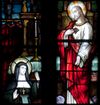Religion:Divine Mercy novena
Divine Mercy novena is a Catholic novena composed by Saint Faustina Kowalska in her diary Divine Mercy in my Soul as part of the Divine Mercy devotion.[1] Each day of the novena consists of praying to God the Father and Jesus for a different group of people - in particular, Catholics - by immersing them in the Sacred Heart.[2] The nine groups include: all mankind, but especially sinners;[3] Catholic priests and religious;[4] devout and faithful Catholics;[5] pagans and the ignorant;[6] Catholic heretics and schismatics;[7] the childlike and children;[8] devotees of the Divine Mercy;[9] souls in Purgatory;[10] and the lukewarm.[11] According to Faustina, Jesus told her that she will pray the Divine Mercy novena in heaven and that he will bring the people she prays for into heaven.[12] He also told her that, because she would beg for his divine grace for the people in light of his Passion, he would not deny granting the people any of his grace.[13] The divine mercy novena was published, albeit not unchanged, in the 1937 pamphlet Christ King of Mercy.[14]
Groups of people
According to Faustina, Jesus said that he is comforted in his agony over the damnation of souls when one prays for sinners;[15] that the priests and religious of the Catholic Church strengthen him during his Passion, and that he in turn uses them as channels through which his mercy flows out upon the world;[16] that devout and faithful Catholics console him on his way to Calvary;[17] that pagans' and the ignorants' future Catholic zeal comfort him in his Passion;[18] that heretics and schismatics wound his body the church during his Passion, but also alleviate his wounds by reconciling with the church;[19] that the childlike and children most resemble Jesus, like angels keeping vigil at the altar, and strength him in his agony over damnation;[20] that devotees of the Divine Mercy weep the most over his Passion and live the most in the Holy Spirit, and that they will not go to hell but shine with a unique glory in heaven;[21] that souls in Purgatory can be alleviated by his precious blood and by offering indulgences and alms for them to God;[22] and that the lukewarm cause him to suffer the most in Gethsemane, causing him to beg the Father to take the cup away from him.[23]
References
- ↑ Divine Mercy in My Soul 1209
- ↑ Divine Mercy in My Soul 1209
- ↑ Divine Mercy in My Soul 1210-1211
- ↑ Divine Mercy in My Soul 1212-1213
- ↑ Divine Mercy in My Soul 1214-1215
- ↑ Divine Mercy in My Soul 1216-1217
- ↑ Divine Mercy in My Soul 1218-1219
- ↑ Divine Mercy in My Soul 1220-1223
- ↑ Divine Mercy in My Soul 1224-1225
- ↑ Divine Mercy in My Soul 1226-1227
- ↑ Divine Mercy in My Soul 1228-1230
- ↑ Divine Mercy in My Soul 1209
- ↑ Divine Mercy in My Soul 1209
- ↑ Divine Mercy in My Soul footnote 206
- ↑ Divine Mercy in My Soul 1210-1211
- ↑ Divine Mercy in My Soul 1212-1213
- ↑ Divine Mercy in My Soul 1214-1215
- ↑ Divine Mercy in My Soul 1216-1217
- ↑ Divine Mercy in My Soul 1218-1219
- ↑ Divine Mercy in My Soul 1220-1223
- ↑ Divine Mercy in My Soul 1224-1225
- ↑ Divine Mercy in My Soul 1226-1227
- ↑ Divine Mercy in My Soul 1228-1230


